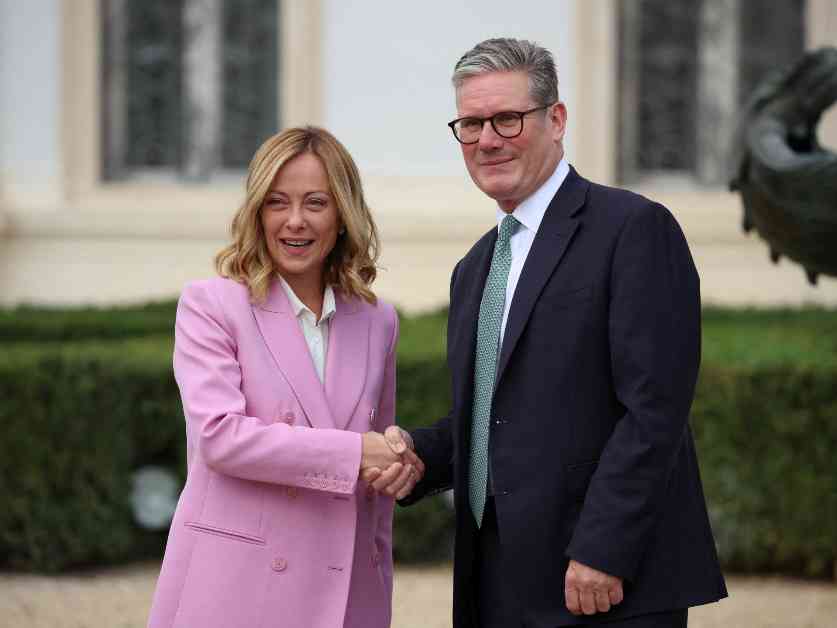Lessons in Immigration Policy: UK PM Starmer Looks to Italy’s Meloni for Inspiration
British Prime Minister Keir Starmer’s recent meeting with Italian counterpart Giorgia Meloni in Rome has sparked controversy and criticism from various quarters. The meeting, aimed at discussing strategies to address irregular immigration, has raised eyebrows due to Meloni’s far-right stance on the issue.
Prior to the meeting, Starmer expressed his interest in understanding Italy’s successful reduction in migrant arrival numbers. This visit comes at a crucial time for the United Kingdom, as the issue of undocumented migrants and asylum seekers arriving in small boats from France remains a pressing concern for the government.
Meeting with Far-Right Leader
Starmer’s decision to engage with Meloni, who leads the far-right anti-immigration Brothers of Italy party, has drawn sharp criticism from members of his own left-leaning Labour Party. Labour MP Kim Johnson labeled the meeting as “disturbing,” accusing Starmer of seeking inspiration from a neo-fascist government.
The timing of the meeting is significant, considering recent far-right riots in the UK targeting mosques and migrant accommodation centers. The rise in anti-immigrant sentiments across Europe has put pressure on political leaders to address the issue effectively while upholding human rights and safety.
Tackling Illegal Immigration
Since assuming office, Starmer has reiterated his commitment to combating illegal immigration, despite rejecting the previous government’s controversial plan to fly asylum seekers to Rwanda. The UK Home Secretary, Yvette Cooper, defended the government’s approach, emphasizing the importance of cracking down on criminal gangs involved in human trafficking and endangering lives.
While Starmer has ruled out the Rwanda plan, he has not dismissed the possibility of exploring offshore processing centers for asylum claims. Italy’s agreements with countries like Albania and Tunisia serve as potential models for such arrangements, where asylum seekers are housed while their claims are processed, with rejected applicants being returned to their countries of origin.
International Cooperation and Human Rights Concerns
Italy’s collaborations with Albania and Tunisia, aimed at curbing irregular migration, have raised human rights concerns among advocacy groups. The pushback policies, which involve intercepting refugees at sea and returning them to countries like Libya, have been criticized for exposing vulnerable individuals to torture, abuse, and arbitrary detention.
The agreements with Tunisia and Libya reflect a broader trend in Europe, where countries are increasingly resorting to external partnerships to manage migration flows. While these measures may reduce arrivals in the short term, they raise ethical questions about the treatment of asylum seekers and refugees, as well as the broader implications for international human rights norms.
Lessons Learned and Challenges Ahead
Starmer’s visit to Italy highlighted the importance of prevention and addressing root causes of migration to effectively manage the issue. By focusing on efforts in countries of origin to discourage risky journeys and irregular migration, governments can potentially reduce the flow of asylum seekers and migrants attempting dangerous crossings.
As the UK grapples with the complexities of immigration policy, the lessons learned from Italy’s approach provide valuable insights into the challenges and opportunities in addressing irregular migration. Balancing security concerns with humanitarian considerations remains a delicate balance for policymakers, requiring a nuanced and comprehensive strategy to navigate the complex landscape of migration management.
In conclusion, the meeting between UK PM Starmer and Italian PM Meloni underscores the intricate nature of immigration policy in an increasingly interconnected world. By engaging with diverse perspectives and experiences, leaders can gain valuable insights into effective strategies for managing migration while upholding fundamental rights and principles of dignity and respect for all individuals.



























